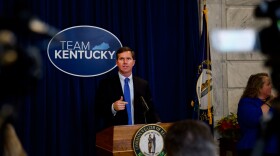Businesses are asking to be shielded from lawsuits filed by customers and employees who contract coronavirus, but labor groups worry that doing so would chip away at protections designed to keep workers and customers safe.
The proposal, which is currently being discussed in Congress, comes as many non-essential Kentucky businesses that have been closed during the pandemic are starting to reopen.
Federal lawmakers are debating whether to pass another coronavirus relief package for people, businesses and state governments struggling during the pandemic.
But Kentucky’s senior senator, Majority Leader Mitch McConnell says that any relief bill must also provide some legal immunity to businesses opening back up.
“We have to make sure opportunistic trial lawyers are not lurking on the sidewalk outside every small business in America waiting to slap them with a lawsuit the instant they turn the lights back on," McConnell said last week.
The Democratic-led House unveiled a bill that would include another round of stimulus checks, aid to states experiencing a massive decline in tax revenues and hazard pay for essential workers responding to the pandemic.
But Republican leaders of the Senate have already rejected it. McConnell called it a “laundry list of pet priorities.”
McConnell hasn’t unveiled his proposal yet, so we don’t know exactly what’s in it.
But Kate Shanks, vice president of public affairs for the Kentucky Chamber of Commerce, says that business want assurances that they won't get sued if they follow guidelines like providing masks for employees, requiring social distancing, cleaning and conducting health checks.
“If they’re doing all of these things correctly, there’s concern that if someone becomes ill—maybe catching the virus somewhere else in the community—that they could still end up being liable somehow," Shanks said.
Kentucky is currently at the beginning of reopening the economy during the pandemic. This week, office-based businesses and those that have been closed in industries like manufacturing, construction, car and boat sales and horse racing were allowed to reopen.
Government agencies will be allowed to reopen next Monday and retail business can reopen at 33% capacity on Wednesday.
Shanks says businesses can follow the safety requirements, but many can’t afford to defend themselves if they get sued.
“Even if they’ve done the right things, they still have to defend themselves, they have to litigate and it can be very costly and it could cause a business to go out of business," Shanks said.
But labor groups worry that shielding employers during the coronavirus pandemic will give immunity to bad actors, too.
Caitlin Blair is the spokesperson for United Food and Commercial Workers Local 227, which represents meat-packers and grocers—workers in industries that have remained open during the pandemic.
She says that the government is already not enforcing safety regulations in companies, and that more legal protections will only make the situation worse.
“Immunity is just allowing business to pick and choose what they’re going to do for their workers," Blair said.
At least 481 meat-packers have been diagnosed with coronavirus in Kentucky and two have died so far during the pandemic, according to arecent report from the Ohio Valley Resource.
Bill Londrigan, president of Kentucky’s AFL-CIO chapter, says that lawmakers pushing for legal immunity have misplaced their priorities.
“Instead of focusing on making sure workers are safe in their workplaces, that should be the priority, not trying to shield employers from any kind of liability for them not complying or not providing the necessary protections that workers need to feel safe on the job," Londrigan said.
Employees who get sick on the job are already covered by Kentucky’s workers compensation system, with some exceptions. Almost all businesses are required to pay for workers compensation insurance, and if an employee gets injured or sick on the job, they are required to file a workers comp claim instead of suing their employer.
That is, unless the worker can prove there was “deliberate intention” to injure or infect a worker.
Scott Bauries, an employment law professor at the University of Kentucky, says even under the current system, there’s a really high bar for workers suing their bosses for getting sick on the job.
“Unless the employer is going around and deliberately coughing in people’s faces. With an illness it’s already very difficult to prove that worker’s compensation should apply," Bauries said.
Bauries says, it’s more likely that a customer would sue a business for not taking the required steps to prevent coronavirus from spreading.
And he says it still might be difficult to pin liability on a business for transmitting a disease that’s widespread in the community to a customer.
“Customers make the decision or not to come into a place and do business with that place. Especially with Amazon and all that other stuff out there, you’ve got plenty of other options other than to go into a place and do business with them," Bauries said.
Still, if businesses are given broad immunity from coronavirus-related lawsuits as McConnell suggests, Bauries says it would be a major change.
"There is a system of tort law that sits out there right now that is meant to police careless conduct that harms innocent individuals who are patronizing a business. And that scheme of liability would arguably go away," Bauries said.
The House is expected to vote on its version of the next coronavirus relief package later this week. It’s unclear when McConnell will unveil his version.





